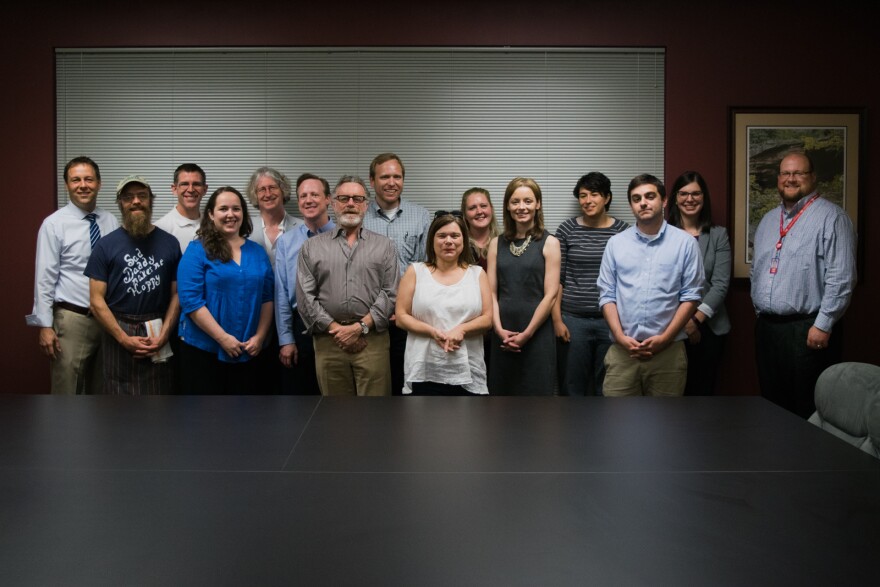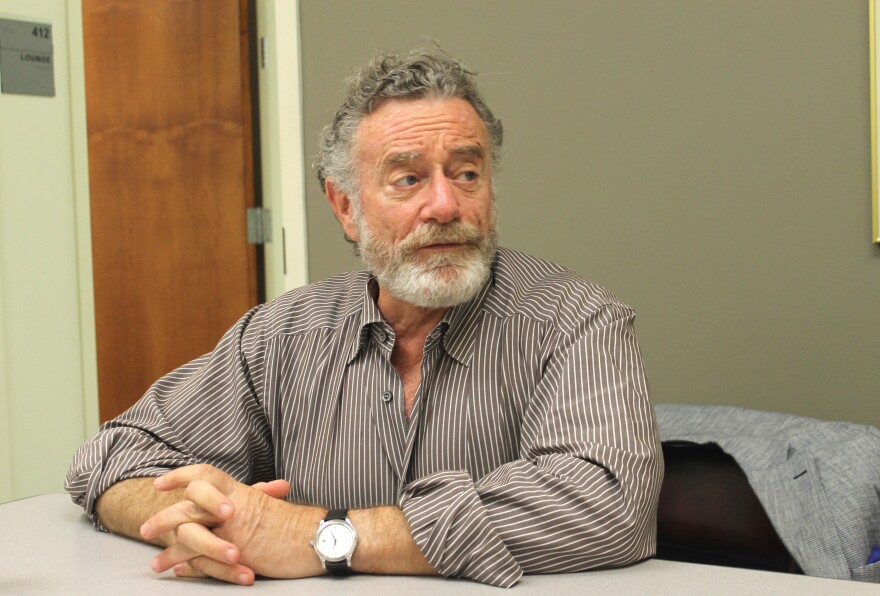The head of NPR is on a road trip across America, which Wednesday brought him through Arkansas where he stopped for lunch with the staff of UALR Public Radio.
It’s a three week trip for network CEO Jarl Mohn and his wife. He spoke with KUAR’s Michael Hibblen about his background, the future of public radio, and the impact the presidential election is having on NPR. You can hear the full discussion above.
MICHAEL HIBBLEN: Tell me about this road trip. What are you doing?
JARL MOHN: Well, I'm taking three weeks to travel across the country. I've never driven across the country coast-to-coast and I'm using it as an opportunity to visit NPR member stations. I started in Washington, DC, I'm going to end up in Los Angeles. I'll visit 25 towns and cities and call on something like 34 of our NPR member stations.
HIBBLEN: And have you been to Arkansas before?
MOHN: I have been to Arkansas before, but I haven't been here at the station so this is a first for me.
HIBBLEN: Tell me a little about your background. You started out as a music DJ.
MOHN: Yes, I have to be careful because if people don't hear the full range of what I've done, they become very concerned and very suspicious, and understandably. I began my career as a disc jockey. I did that and was in radio for years and became a program director and general manager. I ended up buying some stations in El Paso, Texas and Louisville, Kentucky, then I got into the cable television business. I ran MTV and VH1 in the '80s and I created E! Entertainment Television in the '90s. Then I left the television business and I was basically in venture investing. I did early-stage digital media investing for 16 years. That's kind of how I came to public radio. I've always loved public radio and one of my not-for-profit activities was to be on the board of KPCC, which is Southern California Public Radio, and like many people listening to KUAR right now, I was a supporter and a big fan and I got involved, got on the board, then became chair of the board, and I always tell people that are supporting the station, be careful, you could end up in this job too. And that's how I ended up here.
HIBBLEN: It's an interesting background for NPR. What was it that you liked about public broadcasting?
MOHN: Well, I've always been a bit of a new junky. One of my other not-for-profits that I was involved with in L.A. was the Annenberg School of Communication and Journalism at USC. I was on that board and I was chairman of that board for eight years, so I'm not a journalist. I've never acted as a journalist or as a news person, but I realize how important it is. It's very important to me. I think it's very important to communities all across the country, so my role, one of the things I wanted to do was do whatever I can to support journalism. So when this role came up, and there had been a fair amount of turnover at NPR, I was asked if there would be any interest, I said, you know, I don't want to work for anybody else. This is the one job in America that I think I'd love doing and I made a commitment to spend at least five years leading the organization.
HIBBLEN: And this is a time of great change for public broadcasting, and for NPR you've got people like Diane Rehm who are going to be leaving and a lot of people concerned. What are your thoughts about the direction that public radio is taking at this point.
MOHN: Well, you know there are a couple of answers to that. First, specifically about the big changes that are occurring, Diane Rehm is stepping down after 37 years, Prairie Home Companion, Garrison (Keilor) has retired, and Car Talk, which has been in reruns for a number of years, is going to be wound down, so these are incredibly big shoes to fill. They're franchises, they're legacies, that's really hard to do. I don't care how good you are, replacing any one of these shows is really going to be an uphill struggle just because people are deeply loyal and deeply passionate about them. So that is the challenge. There is an opportunity here which is creating the next Diane Rehm; somebody, a great, new, young voice that can be for public radio what Diane has been for 37 years. I mean, when Diane started she was very young. When Garrison Keilor began he was very young. And we're trying do that, to expand the question into our on air hosts for the news magazines, adding Ari Shapiro (and) Kelly McEvers to All Things Considered has really changed the pH of the pool I think in a lot of ways. Rachel Martin will be joining Morning Edition after the election. These are younger voices, and then podcasting is also doing the same thing. Kelly McEvers has a great one called Embedded. It's a remarkable podcast and it's great journalism and 75 percent of the audience, people that listen to that show, are under 35. So we think this is a really great gateway into listening to and understanding and appreciating public radio.
HIBBLEN: Yeah, we've been doing a podcast here for about a year and a half and it's really great having a kind of unstructured format to let it go where it will.
MOHN: And I think it will bring different folks in and they'll start to appreciate the sound of public radio and what KUAR does and what NPR does.
HIBBLEN: And finally, this election cycle, what has this been like for NPR? Donald Trump verses Hillary Clinton.
MOHN: Well I think there's so many different ways to answer that. I would say this: one of the really interesting things about this election, say what you will about it, it is maybe the best civics lesson that any of us could ever have because a whole range of things have occurred. Issues that have come up have never come up before and it's questions about journalism, it's questions about the electoral process, it's questions about the primary, questions about the whole system. You have two candidates, there's not a lot of deep love and passion on either side. This morning on Morning Edition we heard four people being interviewed in the state of Florida, all with very different points of view and all of them were very nuanced in how they've come to decide who they are going to vote for. The one advantage for us is that at a time when we're making all these changes to NPR to do better storytelling, to be more live, to do better analysis like our fact-checking, a lot of people will take advantage of that during the debate tonight. Eight to nine million people are coming in to our website for that fact-checking. This is such an interesting, and to use a fun word, dynamic situation that I think it's bringing a lot of people that haven't been listening to us and I hope they fall in love with the kind of journalism we do and the kind of storytelling we do so, even though it's odd and in a lot of ways a bit frightening, I think it has presented an opportunity to us to introduce a lot more people to what you do here at KUAR and what we do at NPR.
HIBBLEN: Jarl Mohn is the CEO of NPR, he's on a road trip traveling through Arkansas, where do you go next?
MOHN: I'm going to Fayetteville, then Bentonville, Tulsa, Oklahoma, Oklahoma City, Lawton and Abilene, Texas.
HIBBLEN: Well great, say hello to our friends there at KUAF.
MOHN: I will.




